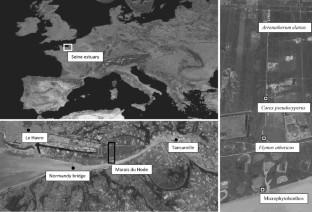Wetlands ( IF 2 ) Pub Date : 2023-11-03 , DOI: 10.1007/s13157-023-01747-7 Jérôme Morelle , Laurent Jeanneau , Anniet M. Laverman

|
Microbial nitrate reduction in wetland soils and sediments plays an important role mitigating the excess of nitrogen released into the environment. The reduction of nitrate to its reduced gaseous form, i.e. denitrification, is tightly linked to the oxidation of organic carbon. In intertidal wetlands, the organic carbon derived from aquatic or terrestrial primary producers strongly differs in composition, which in turn might affect nitrate reduction rates. In the current study the impact of carbon quality on benthic nitrate reduction in a temperate intertidal wetland sediment was determined. To this end, nitrate reduction rates were determined over a three-week period using an anoxic controlled flow-through reactor approach using sediments amended with carbon from different vegetation types. Organic carbon from algal or plants was mixed with the sediment at the same absolute quantity of carbon. A significant initial increase in nitrate reduction rates was observed in the presence of algal (microphytobenthos) derived organic carbon, most likely due to its labile structure; however, rates decreased rapidly, most likely due to a depletion of the labile source. This indicates the dependence of denitrifiers to the microalgae turnover in non-vegetated sediment. Despite a delay, the addition of plant derived organic carbon, increased nitrate reduction rates with a higher amount of total nitrate reduced over the duration of experiment compared to the microphytobenthos addition. These results highlight that presence of both labile and recalcitrant carbon sources in sediment is essential to support an efficient nitrogen biogeochemical cycle.
中文翻译:

有机碳质量影响底栖微生物硝酸盐还原
湿地土壤和沉积物中的微生物硝酸盐还原对于减少释放到环境中的过量氮起着重要作用。硝酸盐还原成还原气态,即反硝化,与有机碳的氧化密切相关。在潮间带湿地中,来自水生或陆地初级生产者的有机碳在成分上存在很大差异,这反过来可能会影响硝酸盐还原率。在当前的研究中,确定了碳质量对温带潮间带湿地沉积物中底栖硝酸盐还原的影响。为此,使用缺氧控制流通反应器方法,使用用来自不同植被类型的碳修正的沉积物,确定了三周内的硝酸盐还原率。来自藻类或植物的有机碳以相同的绝对碳量与沉积物混合。在藻类(底栖微生物)衍生的有机碳存在的情况下,观察到硝酸盐还原率最初显着增加,很可能是由于其不稳定的结构;然而,比率迅速下降,很可能是由于不稳定来源的耗尽。这表明反硝化菌对非植被沉积物中微藻周转的依赖性。尽管有延迟,但与添加微型底栖植物相比,在实验期间,添加植物来源的有机碳,增加了硝酸盐还原率,并且总硝酸盐含量较高。这些结果强调,沉积物中不稳定和顽固碳源的存在对于支持有效的氮生物地球化学循环至关重要。



























 京公网安备 11010802027423号
京公网安备 11010802027423号